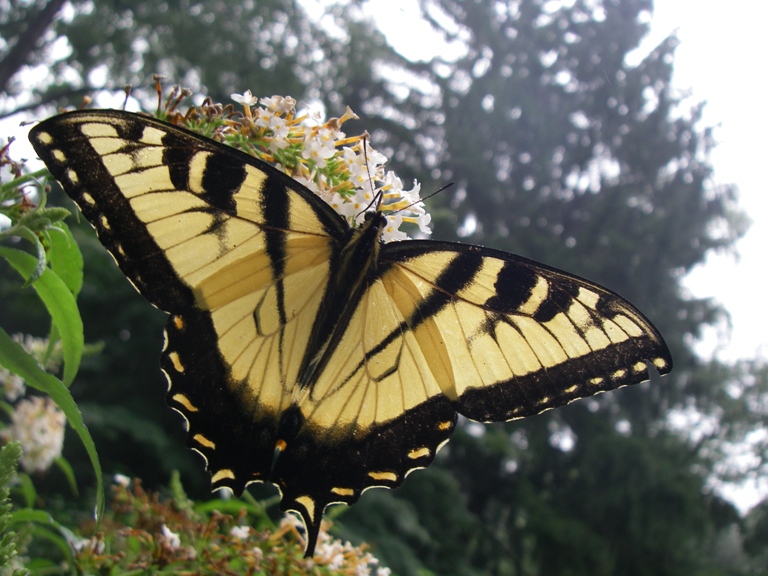Gardening for butterflies
We have many species of butterflies in the Chadds Ford area. If you would like to encourage these beautiful creatures to visit your yard, consider making your garden butterfly friendly. It’s relatively easy to find plants with nectar-filled flowers that attract butterflies. But why not go a little further.
Here are some tips:
Plant in a Sunny location
Butterflies are cold blooded and need to be warm to fly and feed, so plant your garden in a sunny area sheltered from the wind. Provide shelter from windy days can batter a butterfly and tear its wings. If there is no natural shelter, plant a windscreen such as a flowering shrub that can provide both food and shelter.
Establish Host Plants
Butterflies do not eat, they only sip nectar. But in their caterpillar stage, they must eat large amounts of food for rapid growth prior to their transformation into a butterfly. Caterpillars are very particular about their food requirements, often only feeding on a single group of closely related plants. For example, monarch caterpillars only eat plants in the milkweed family (Asclepias). Planting a variety of host plants will ensure you attract a wide range of butterflies. Some common host plants include asters (pearl crescents), dill or parsley (black swallowtails), sassafras and spicebush (spicebush swallowtail), dogwood (spring azure), and willow (mourning cloak and viceroy). Offer Nectar Plants which butterflies need nectar to provide energy. Generally they prefer purple, red, yellow, orange, or pink blossoms; flat-topped or clustered flowers; and short flower tubes. Good nectar plants include ironweed, lantana, butterfly weed, pentas, coreopsis, verbena, zinnia, bee balm, coneflowers, black-eyed susans, and sunflowers. Some plants, such as butterfly weed, are both a host plant and a nectar plant. Emphasize Native Plants Many cultivated flowers have been selected for their appearance, not for their fragrance or the amount of nectar they contain. Therefore, it is often better to choose common varieties for butterfly gardens instead of fancier hybrids that may have less nectar or flower tubes that are difficult for butterflies to access.
Create Expanses of Flowers
Butterflies are more attracted to groupings of flowers than to a single plant with a few blooms, so plant swaths of flowers rather than spreading them throughout the garden.
Establish a Long season of Bloom
A well-planned butterfly garden has blooming flowers throughout spring, summer, and early autumn. This provides a continuous source of food and nectar, and provides plants of varying heights to accommodate large and small butterflies.
Don’t be too tidy
Butterflies are attracted to weedy areas, so an area left unmowed and allowed to grow will further entice butterflies into your yard. Minimize use of pesticides. Limit your use of insecticides and herbicides, if you use them at all. Insecticides don’t know the difference between beneficial insects and “pest” insects. A chemical that kills tent caterpillars, for example, will just as effectively kill monarch caterpillars. If you want butterflies, share your plants with their caterpillars and tolerate some damage.
Provide Mud and Rocks
Place a few rocks in sunny areas to give the butterflies a good place to bask. Also provide wet sand or mud. Male butterflies will often gather at wet sand patches and mud puddles. This phenomenon, called puddling, provides minerals and other nutrients that the males “gift” to females during mating.
For more information on gardening for butterflies, go to:
http://pubs.cas.psu.edu/FreePubs/pdfs/uh139.pdf. Another great resource
is http://monarchwatch.org where you can find out how to get your garden
certified as a Monarch Waystation.
Have a gardening question? Ask a Master Gardener!
Call the Master Gardener Hotline: 610-696-3500 or
email ChesterMG@psu.edu.
Visit Chester County Master Gardeners on Facebook.
• Nancy Sakaduski is the Chester County Master Gardener Coordinator.
Master Gardeners are trained volunteers who educate the public on
gardening and horticultural issues. In Chester County, they operate
through the Penn State Cooperative Extension office in West Chester.
Nancy lives in Pennsbury Township. She can be reached at nds13@psu.edu.
About Nancy Sakaduski
Nancy Sakaduski is a Master Gardiner with Penn State Extension of Chester County.




Comments